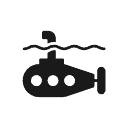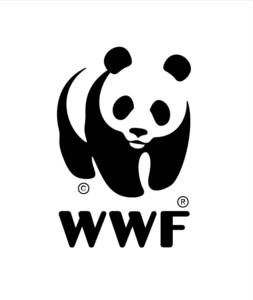Are you a seafood lover?
Play this game and check your carbon footprint!
scroll down for game background info

rules of thumb for climate-friendly seafood choices
These seven rules of thumb keep your seafood carbon footprint low.
You’LL GET TO KNOW THEM IF YOU PLAY THE GAME!

1. airfrEight is the worst
↓ read why airfrEight has a massive impact on THE CARBON FOOTPRINT ↓
Transport is usually not the most important contributor to GHG in seafood. However, if you choose fresh fish stay local, as fresh fish from further away usually gets transported by airplane with a big GHG footprint.
- If you buy fresh fish, make sure it was caught or farmed in your region. Avoid fresh fish that comes from far away sources and that was likely transported by plane.
- Prefer sustainable local fresh seafood as the best option!

2. don’t GO WITH bottom trawl
↓ read why bottom trawl is bad for the climate and the ocean ↓
- Bottom trawl gear (like beam trawls or otter trawls) is normally very heavy, and it is dragged long distances. Of course, this takes much more fuel than towing a net through the water column alone. Additionally, bottom trawl often adversely impacts the seabed.
- Choose small pelagic fish (herring, sardines, mackerel or other small schooling fish) that live in the water column and not near the bottom, and that are caught with purse seines or pelagic trawls
- Generally, avoid seafood that is caught with bottom trawls, especially bottom trawled shrimp and mussels

3. distance doesn’t matter
↓ read why it’s the transportation method that matters ↓
- Transport is usually not the most important contributor to GHG in seafood. If fish is transported frozen, it actually does not make a big difference in terms of total CO2 if it comes from European waters or from overseas, as it comes via ship
- However, if you choose fresh fish stay local as fresh fish from other parts of the world usually gets transported by airplane with a big GHG footprint
- Frozen fish from overseas can be a good choice when it comes from a sustainable source
- Prefer sustainable local fresh seafood as the best option!

4. small fish are better than big fish
↓ read why sardines are better than hake ↓

5. choose veggie fish
↓ read why herbivore species are better than carnivore species ↓
- For aquaculture, buy fish species that don’t need a lot of wild fish as food – like carp, pangasius or tilapia. It is a better choice than farmed predatory fish like seriola, seabass or salmon
- Farmed mussels are also an excellent option with a lower carbon footprint
- Seaweed – whether as nori in your sushi, as hip crackers or as a yummy addition to your meal, seaweed farming not only has a low carbon footprint but also serves as a ‘carbon sink’ which helps counteract global warming and ocean acidification

6. don’t buy deep sea species
↓ read why you shouldn't eat deep sea species ↓
- Deep sea fish grow very, very slowly and it is nearly impossible to harvest them in a sustainable way
- Because they live deep in the ocean, it takes a lot of effort to catch them and to bring them to the surface
- Often bottom trawl gear is used that need tremendous amounts of energy (and that destroys the seafloor)
- Additionally, deep sea fish play an important role carrying carbon from the surface to the seafloor. If you eat fish like orange roughy, blue ling or golden redfish, you disturb this important ecological pump

7. don’t buy overfished seafood
↓ read why overfishing leads to A higher carbon footprint ↓
- If there’s enough fish, fishers don’t have to travel so far and don’t need so much energy to find and catch them
- Additionally, larger fish populations help to support healthy ecosystems that will better withstand climate changes
overview: the average greenhouse gas impact of 1 kg of seafood
(in kilograms of CO2 equivalents)
- Potatoes: 0,1 kg CO2e / kg
- Small pelagics: 0,4 kg CO2e / kg
- Chicken: 2 kg CO2e / kg
- Carp: 3 kg CO2e / kg
- Salmon aquaculture: 4,7 kg CO2e / kg
- Shrimp bottom trawl: 34,8 kg CO2e / kg
- Beef (meadow systems): 38 kg CO2e / kg
- Sheep: 48 kg CO2e / kg
- 300 km by car: 63 kg CO2e / kg
So there is “good” and “bad” seafood?
Fish is a crucial source of food for more than 3.1 billion people, providing 20 percent of their animal protein intake. [1] The average European eats 24 kg of seafood per year. [2] The graphics above show that fish’s impact on the climate can vary from very low to very high.
What are carbon equivalents (CO2e)?
We use the term ‘CO2’ in this game to keep things simple, but our calculations include contributions from other greenhouse gases too. So in fact, we are talking about CO2 equivalents.
The emissions figures in the game are for 1kg of the seafood chosen. A carbon dioxide equivalent or CO2 equivalent (CO2e) is a metric measure that converts emissions from various greenhouse gases on the basis of their global warming potential to the equivalent amount of carbon dioxide with the same global warming potential.
You’ve read a lot now!
Try out the game and prove you’re an expert on climate friendly seafood!
800 million people depend on fish for food and income.
Use WWF seafood guides to avoid overfishing!
Austria: fischratgeber.wwf.at
Bulgaria: riba.wwf.bg
Croatia: www.kojuribukupiti.org
France (part of Fish Forward 2015-2017): www.consoguidepoisson.fr
Greece: fishguide.wwf.gr
Germany (relaunched, different design): fischratgeber.wwf.de
Italy: pescesostenibile.wwf.it
Poland (different design, not a Fish Forward product): : ryby.wwf.pl
Portugal: guiapescado.wwf.pt
Romania (part of Fish Forward 2015-2017): ghidpeste.wwf.ro
Slovenia: www.kateroribokupiti.si
Spain (part of Fish Forward 2015-2017): guiadepescado.wwf.es
Tunisia: www.guideconsopoissons.tn
Turkey: www.balikrehberi.org
Belgium (bilingual, not part of the Fish Forward Project): www.fishguide.be
source information
[1] Béné, C. et al. 2015. Feeding 9 billion by 2050 – Putting fish back on the menu. Food Security – The Science,Sociology and Economics of Food Production and Access to Food, 7: 261-274.
[2] EUMOFA (European Market Observatory for Fisheries and Aquaculture Products). The EU Fish Market. 2018 Edition.
https://ec.europa.eu/fisheries/press/eu-fish-market-2018-edition-out_enhttp://www.eumofa.eu/documents/guest/Yearly%20Highlights/The%20EU%20fish%20market_EN.pdf
[3] Values are based on the following references: Nijdam et al. (2012). The price of protein: Review of land use and carbon footprints from life cycle assessments of animal food products and their substitutes. Food Policy. 37. 760–770. 10.1016/j.foodpol.2012.08.002.;http://www.powered-by-produce.com/2010/01/13/carbon-footprint-of-food/; https://pub.epsilon.slu.se/8710/1/roos_e_120413.pdf; Ripple et al. (2014). Ruminants, climate change and climate policy. NATURE CLIMATE CHANGE (4)
terms of use, disclaimer and credits: the WWF “finprint” game
The information on this site and the “finprint” game is subject to a disclaimer, a copyright notice and rules on personal data protection.
Disclaimer:
The Fish Forward project is co-funded by the European Union. The contents of this game are the sole responsibility of WWF and can in no way be taken to represent the views of the European Union.
Andrzej Jurczak, WWF Austria
Scientific supervision:
Simone Niedermüller, WWF Austria
Idea, design, implementation:
Tunnel23 – www.tunnel23.com
Copywriters:
English: Evan Jeffries, www.swim2birds.co.uk
German: Barbara Wallner, www.barbarawallner.at
WWF Austria (WORLD WIDE FUND FOR NATURE)
Ottakringer Straße 114-116
1160 Wien
Register of associations: 751753867
Contact WWF:
Mail: wwf@wwf.at
Phone: +43/1/48817-0
Fax: +43/1/48817-44
Legal Info:
WWF maintains this website and the “finprint” game to enhance public access to information about the Fish Forward project and to raise awareness for issues specified in the project’s objectives. WWF’s goal is to keep this information timely and accurate. If errors are brought to our attention, we will try to correct them. However, WWF accepts no responsibility or liability whatsoever with regard to the information on this site.
This information is:
- of a general nature only and is not intended to address the specific circumstances of any particular individual or entity;
- not necessarily comprehensive, complete, accurate or up to date;
- sometimes linked to external sites over which WWF services have no control and for which WWF assumes no responsibility;
- not professional or legal advice (if you need specific advice, you should always consult a suitably qualified professional).
It is our goal to minimize disruption caused by technical errors. However, some data or information on our site may have been created or structured in files or formats that are not error-free and we cannot guarantee that our service will not be interrupted or otherwise affected by such problems. WWF accepts no responsibility with regard to such problems incurred as a result of using this site or any linked external sites.
This disclaimer is not intended to limit the liability of WWF in contravention of any requirements laid down in applicable national law nor to exclude its liability for matters which may not be excluded under that law.
Personal Data Protection:
WWF is committed to user privacy. Although you can browse through most of these websites without giving any information about yourself, in some cases, personal information is required in order to provide the e-services you request. In this respect, for each specific e-service, a controller determines the purposes and means of the processing of personal data and ensures conformity of the specific e-service with the privacy policy;
Web cookies are small snippets of text saved on your computer or mobile device that distinguish you from other users of a website. Like most websites, this website uses cookies. We use cookies to improve your experience of our website – for example, so you only get asked to take a survey once, or to hide a form if you’ve already seen it. We use cookies to collect anonymous statistics by Google Analytics – it’s really useful for us to be able to see which pages are the most popular and how people are using them. We use cookies for Social media – if you use Twitter or Facebook, cookies can help smooth the sharing process between our site and your online feeds. Information we collect contains details of your visit to our website, including technical information such as the IP address you use to access the website, your device, browser type and version.
If you don’t want cookies, you can set your browser to notify you when you receive one, then choose to decline it. By using our website you consent to our use of cookies as updated from time to time and the cookies we use will be stored on your device (unless rejected or disabled by your browser).
The www.fishforward.eu website provides links to third party sites. Since we do not control them, we encourage you to review their privacy policies.
Copyright:
© 1986 Panda Symbol WWF – World Wide Fund For Nature (Formerly World Wildlife Fund)
® “WWF” is a WWF Registered Trademark















